PM010 - Examining Karl Popper's Falsification Principle Merits
VerifiedAdded on 2023/06/15
|7
|1531
|91
Essay
AI Summary
This essay delves into Karl Popper's falsification principle, a cornerstone of 20th-century philosophy of science. It explores Popper's critique of induction and his emphasis on deductive reasoning, highlighting how falsification encourages scientists to rigorously test and refine their theories. The essay e...
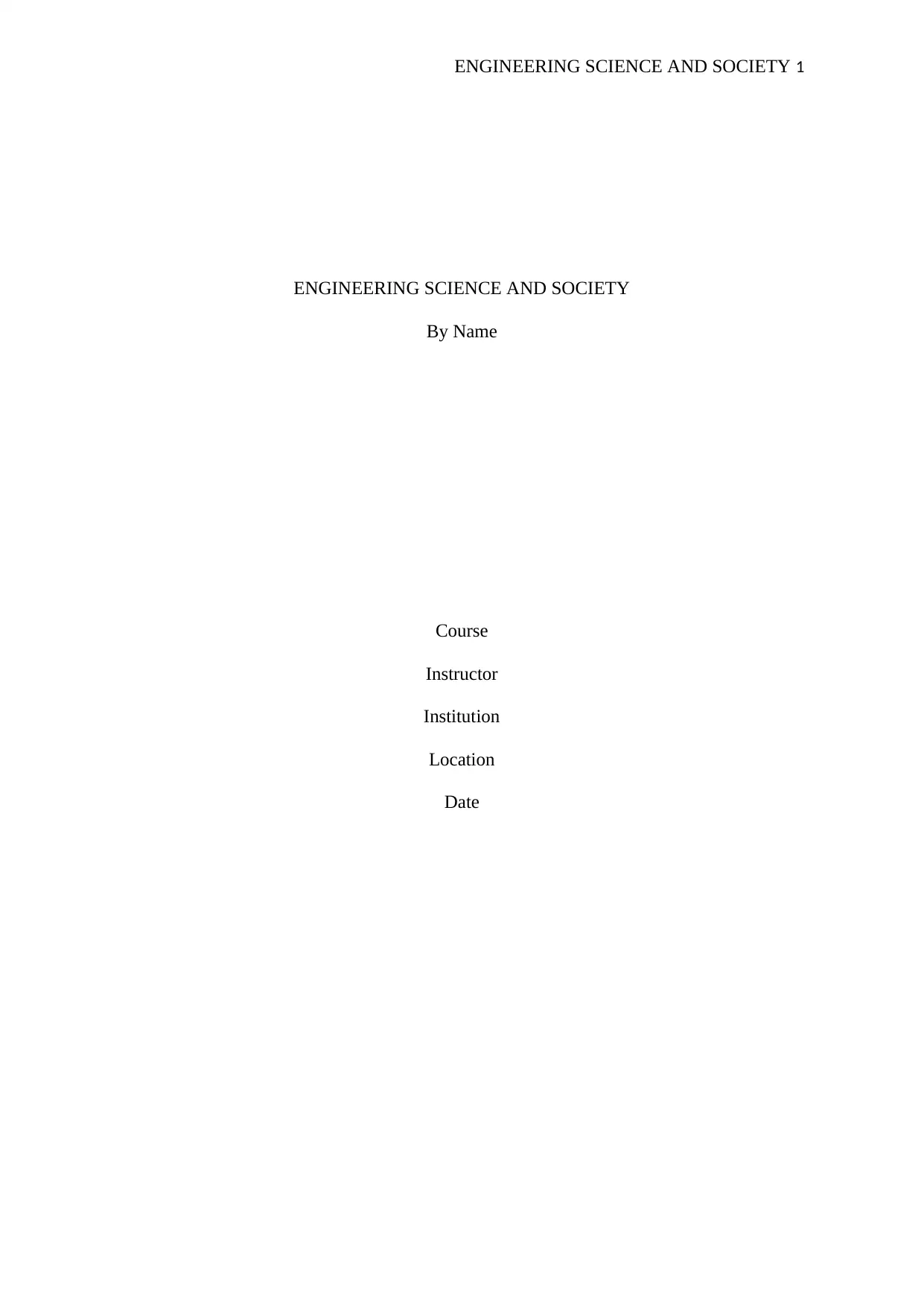
ENGINEERING SCIENCE AND SOCIETY 1
ENGINEERING SCIENCE AND SOCIETY
By Name
Course
Instructor
Institution
Location
Date
ENGINEERING SCIENCE AND SOCIETY
By Name
Course
Instructor
Institution
Location
Date
Paraphrase This Document
Need a fresh take? Get an instant paraphrase of this document with our AI Paraphraser
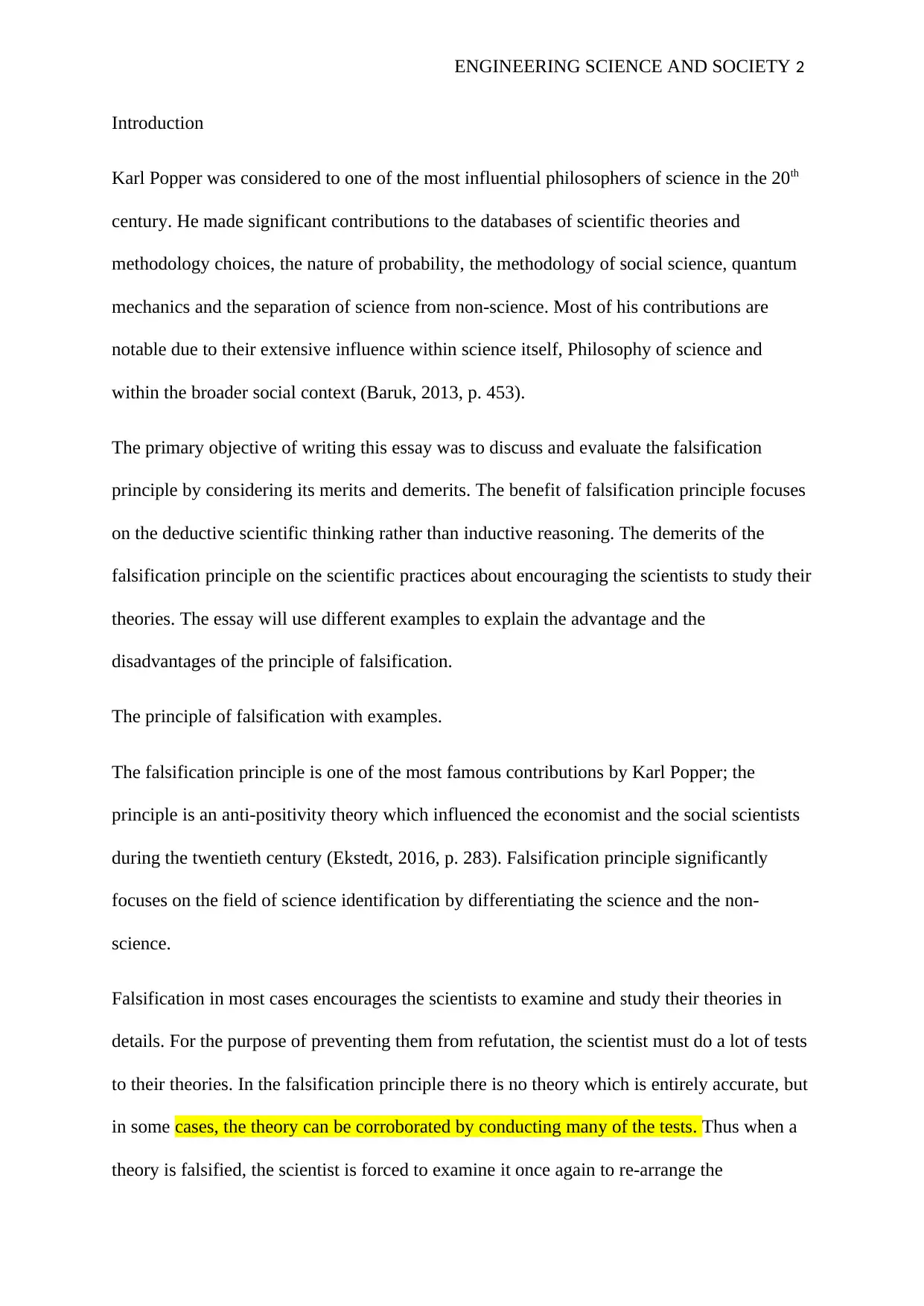
ENGINEERING SCIENCE AND SOCIETY 2
Introduction
Karl Popper was considered to one of the most influential philosophers of science in the 20th
century. He made significant contributions to the databases of scientific theories and
methodology choices, the nature of probability, the methodology of social science, quantum
mechanics and the separation of science from non-science. Most of his contributions are
notable due to their extensive influence within science itself, Philosophy of science and
within the broader social context (Baruk, 2013, p. 453).
The primary objective of writing this essay was to discuss and evaluate the falsification
principle by considering its merits and demerits. The benefit of falsification principle focuses
on the deductive scientific thinking rather than inductive reasoning. The demerits of the
falsification principle on the scientific practices about encouraging the scientists to study their
theories. The essay will use different examples to explain the advantage and the
disadvantages of the principle of falsification.
The principle of falsification with examples.
The falsification principle is one of the most famous contributions by Karl Popper; the
principle is an anti-positivity theory which influenced the economist and the social scientists
during the twentieth century (Ekstedt, 2016, p. 283). Falsification principle significantly
focuses on the field of science identification by differentiating the science and the non-
science.
Falsification in most cases encourages the scientists to examine and study their theories in
details. For the purpose of preventing them from refutation, the scientist must do a lot of tests
to their theories. In the falsification principle there is no theory which is entirely accurate, but
in some cases, the theory can be corroborated by conducting many of the tests. Thus when a
theory is falsified, the scientist is forced to examine it once again to re-arrange the
Introduction
Karl Popper was considered to one of the most influential philosophers of science in the 20th
century. He made significant contributions to the databases of scientific theories and
methodology choices, the nature of probability, the methodology of social science, quantum
mechanics and the separation of science from non-science. Most of his contributions are
notable due to their extensive influence within science itself, Philosophy of science and
within the broader social context (Baruk, 2013, p. 453).
The primary objective of writing this essay was to discuss and evaluate the falsification
principle by considering its merits and demerits. The benefit of falsification principle focuses
on the deductive scientific thinking rather than inductive reasoning. The demerits of the
falsification principle on the scientific practices about encouraging the scientists to study their
theories. The essay will use different examples to explain the advantage and the
disadvantages of the principle of falsification.
The principle of falsification with examples.
The falsification principle is one of the most famous contributions by Karl Popper; the
principle is an anti-positivity theory which influenced the economist and the social scientists
during the twentieth century (Ekstedt, 2016, p. 283). Falsification principle significantly
focuses on the field of science identification by differentiating the science and the non-
science.
Falsification in most cases encourages the scientists to examine and study their theories in
details. For the purpose of preventing them from refutation, the scientist must do a lot of tests
to their theories. In the falsification principle there is no theory which is entirely accurate, but
in some cases, the theory can be corroborated by conducting many of the tests. Thus when a
theory is falsified, the scientist is forced to examine it once again to re-arrange the
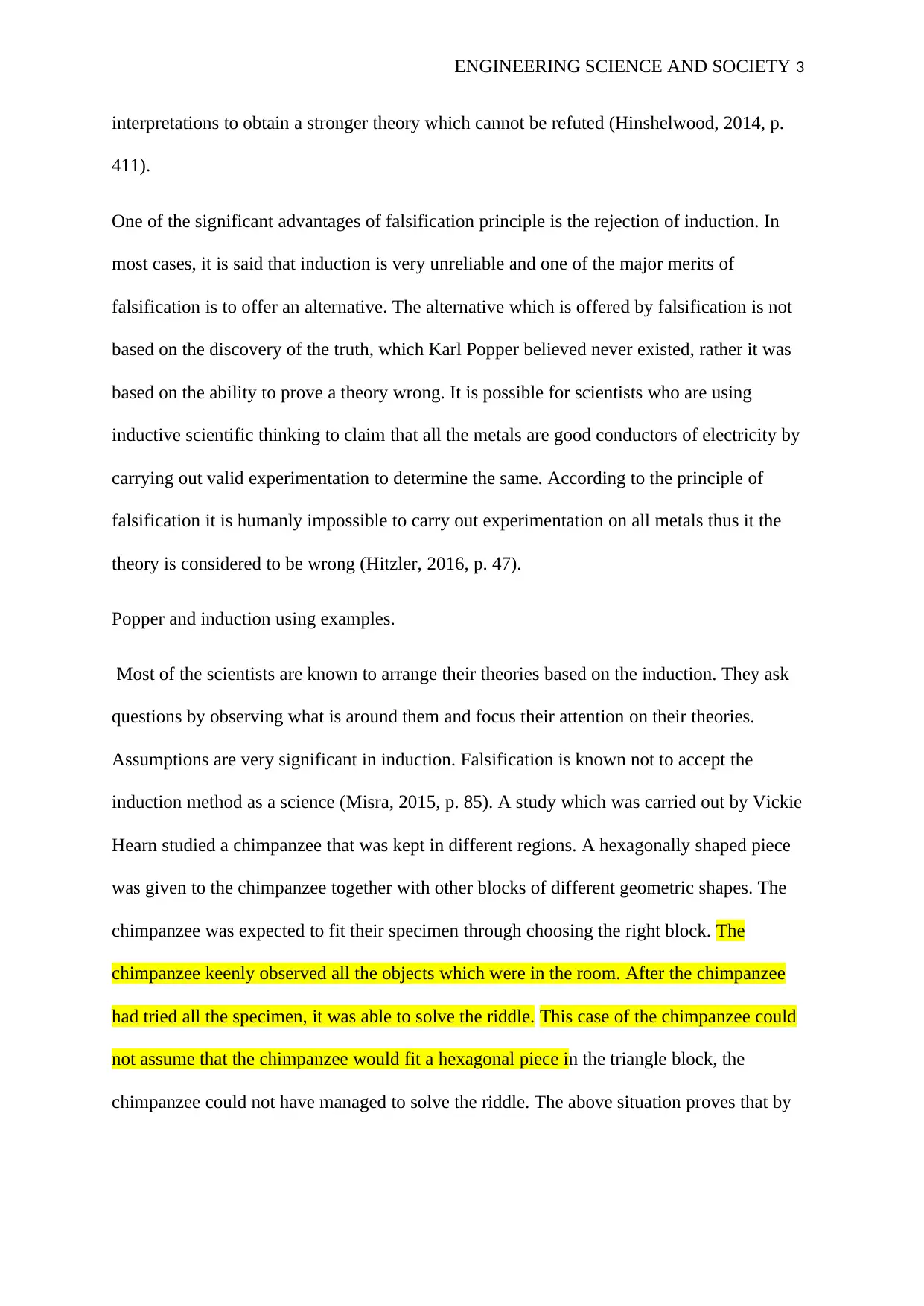
ENGINEERING SCIENCE AND SOCIETY 3
interpretations to obtain a stronger theory which cannot be refuted (Hinshelwood, 2014, p.
411).
One of the significant advantages of falsification principle is the rejection of induction. In
most cases, it is said that induction is very unreliable and one of the major merits of
falsification is to offer an alternative. The alternative which is offered by falsification is not
based on the discovery of the truth, which Karl Popper believed never existed, rather it was
based on the ability to prove a theory wrong. It is possible for scientists who are using
inductive scientific thinking to claim that all the metals are good conductors of electricity by
carrying out valid experimentation to determine the same. According to the principle of
falsification it is humanly impossible to carry out experimentation on all metals thus it the
theory is considered to be wrong (Hitzler, 2016, p. 47).
Popper and induction using examples.
Most of the scientists are known to arrange their theories based on the induction. They ask
questions by observing what is around them and focus their attention on their theories.
Assumptions are very significant in induction. Falsification is known not to accept the
induction method as a science (Misra, 2015, p. 85). A study which was carried out by Vickie
Hearn studied a chimpanzee that was kept in different regions. A hexagonally shaped piece
was given to the chimpanzee together with other blocks of different geometric shapes. The
chimpanzee was expected to fit their specimen through choosing the right block. The
chimpanzee keenly observed all the objects which were in the room. After the chimpanzee
had tried all the specimen, it was able to solve the riddle. This case of the chimpanzee could
not assume that the chimpanzee would fit a hexagonal piece in the triangle block, the
chimpanzee could not have managed to solve the riddle. The above situation proves that by
interpretations to obtain a stronger theory which cannot be refuted (Hinshelwood, 2014, p.
411).
One of the significant advantages of falsification principle is the rejection of induction. In
most cases, it is said that induction is very unreliable and one of the major merits of
falsification is to offer an alternative. The alternative which is offered by falsification is not
based on the discovery of the truth, which Karl Popper believed never existed, rather it was
based on the ability to prove a theory wrong. It is possible for scientists who are using
inductive scientific thinking to claim that all the metals are good conductors of electricity by
carrying out valid experimentation to determine the same. According to the principle of
falsification it is humanly impossible to carry out experimentation on all metals thus it the
theory is considered to be wrong (Hitzler, 2016, p. 47).
Popper and induction using examples.
Most of the scientists are known to arrange their theories based on the induction. They ask
questions by observing what is around them and focus their attention on their theories.
Assumptions are very significant in induction. Falsification is known not to accept the
induction method as a science (Misra, 2015, p. 85). A study which was carried out by Vickie
Hearn studied a chimpanzee that was kept in different regions. A hexagonally shaped piece
was given to the chimpanzee together with other blocks of different geometric shapes. The
chimpanzee was expected to fit their specimen through choosing the right block. The
chimpanzee keenly observed all the objects which were in the room. After the chimpanzee
had tried all the specimen, it was able to solve the riddle. This case of the chimpanzee could
not assume that the chimpanzee would fit a hexagonal piece in the triangle block, the
chimpanzee could not have managed to solve the riddle. The above situation proves that by
⊘ This is a preview!⊘
Do you want full access?
Subscribe today to unlock all pages.

Trusted by 1+ million students worldwide
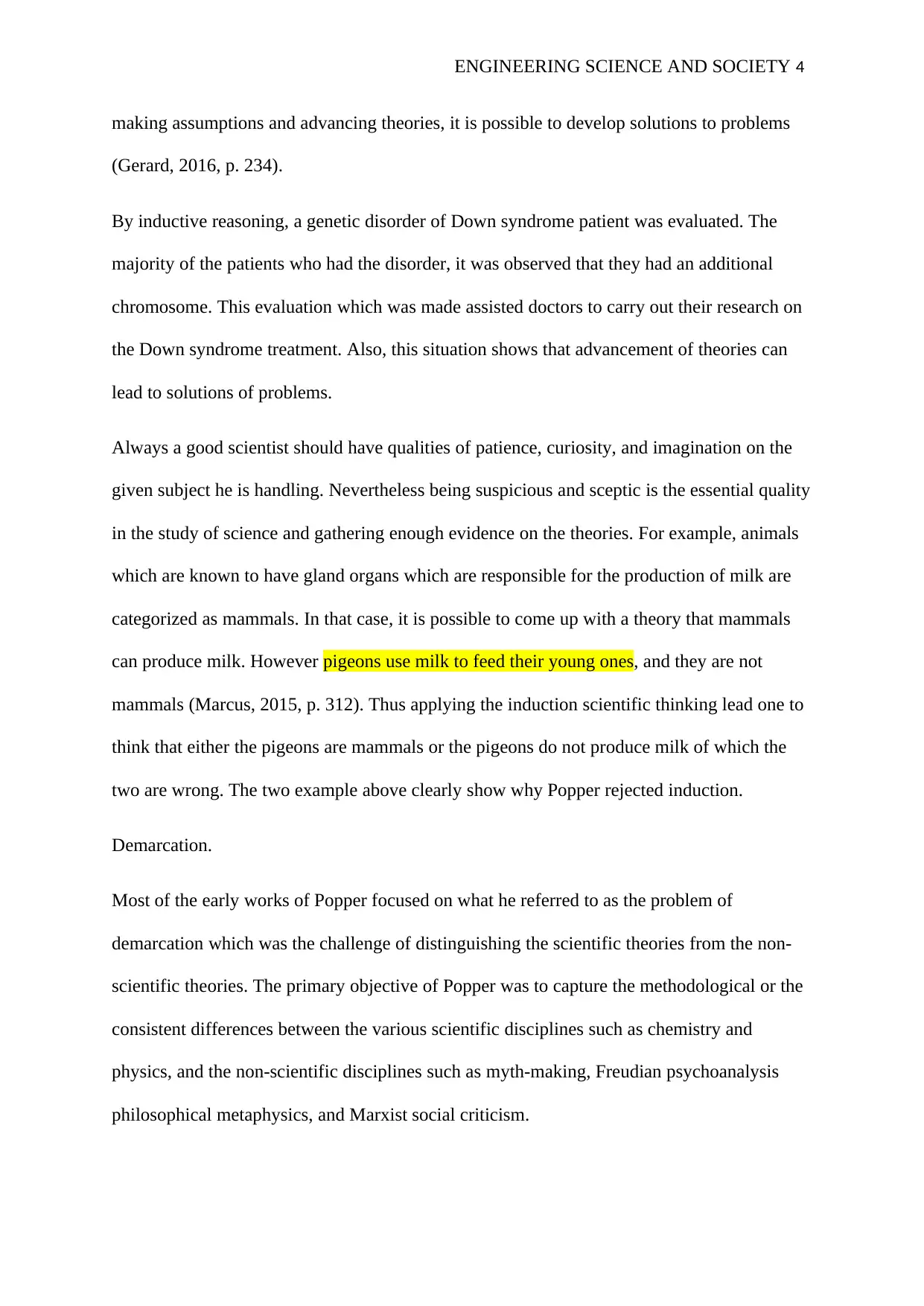
ENGINEERING SCIENCE AND SOCIETY 4
making assumptions and advancing theories, it is possible to develop solutions to problems
(Gerard, 2016, p. 234).
By inductive reasoning, a genetic disorder of Down syndrome patient was evaluated. The
majority of the patients who had the disorder, it was observed that they had an additional
chromosome. This evaluation which was made assisted doctors to carry out their research on
the Down syndrome treatment. Also, this situation shows that advancement of theories can
lead to solutions of problems.
Always a good scientist should have qualities of patience, curiosity, and imagination on the
given subject he is handling. Nevertheless being suspicious and sceptic is the essential quality
in the study of science and gathering enough evidence on the theories. For example, animals
which are known to have gland organs which are responsible for the production of milk are
categorized as mammals. In that case, it is possible to come up with a theory that mammals
can produce milk. However pigeons use milk to feed their young ones, and they are not
mammals (Marcus, 2015, p. 312). Thus applying the induction scientific thinking lead one to
think that either the pigeons are mammals or the pigeons do not produce milk of which the
two are wrong. The two example above clearly show why Popper rejected induction.
Demarcation.
Most of the early works of Popper focused on what he referred to as the problem of
demarcation which was the challenge of distinguishing the scientific theories from the non-
scientific theories. The primary objective of Popper was to capture the methodological or the
consistent differences between the various scientific disciplines such as chemistry and
physics, and the non-scientific disciplines such as myth-making, Freudian psychoanalysis
philosophical metaphysics, and Marxist social criticism.
making assumptions and advancing theories, it is possible to develop solutions to problems
(Gerard, 2016, p. 234).
By inductive reasoning, a genetic disorder of Down syndrome patient was evaluated. The
majority of the patients who had the disorder, it was observed that they had an additional
chromosome. This evaluation which was made assisted doctors to carry out their research on
the Down syndrome treatment. Also, this situation shows that advancement of theories can
lead to solutions of problems.
Always a good scientist should have qualities of patience, curiosity, and imagination on the
given subject he is handling. Nevertheless being suspicious and sceptic is the essential quality
in the study of science and gathering enough evidence on the theories. For example, animals
which are known to have gland organs which are responsible for the production of milk are
categorized as mammals. In that case, it is possible to come up with a theory that mammals
can produce milk. However pigeons use milk to feed their young ones, and they are not
mammals (Marcus, 2015, p. 312). Thus applying the induction scientific thinking lead one to
think that either the pigeons are mammals or the pigeons do not produce milk of which the
two are wrong. The two example above clearly show why Popper rejected induction.
Demarcation.
Most of the early works of Popper focused on what he referred to as the problem of
demarcation which was the challenge of distinguishing the scientific theories from the non-
scientific theories. The primary objective of Popper was to capture the methodological or the
consistent differences between the various scientific disciplines such as chemistry and
physics, and the non-scientific disciplines such as myth-making, Freudian psychoanalysis
philosophical metaphysics, and Marxist social criticism.
Paraphrase This Document
Need a fresh take? Get an instant paraphrase of this document with our AI Paraphraser
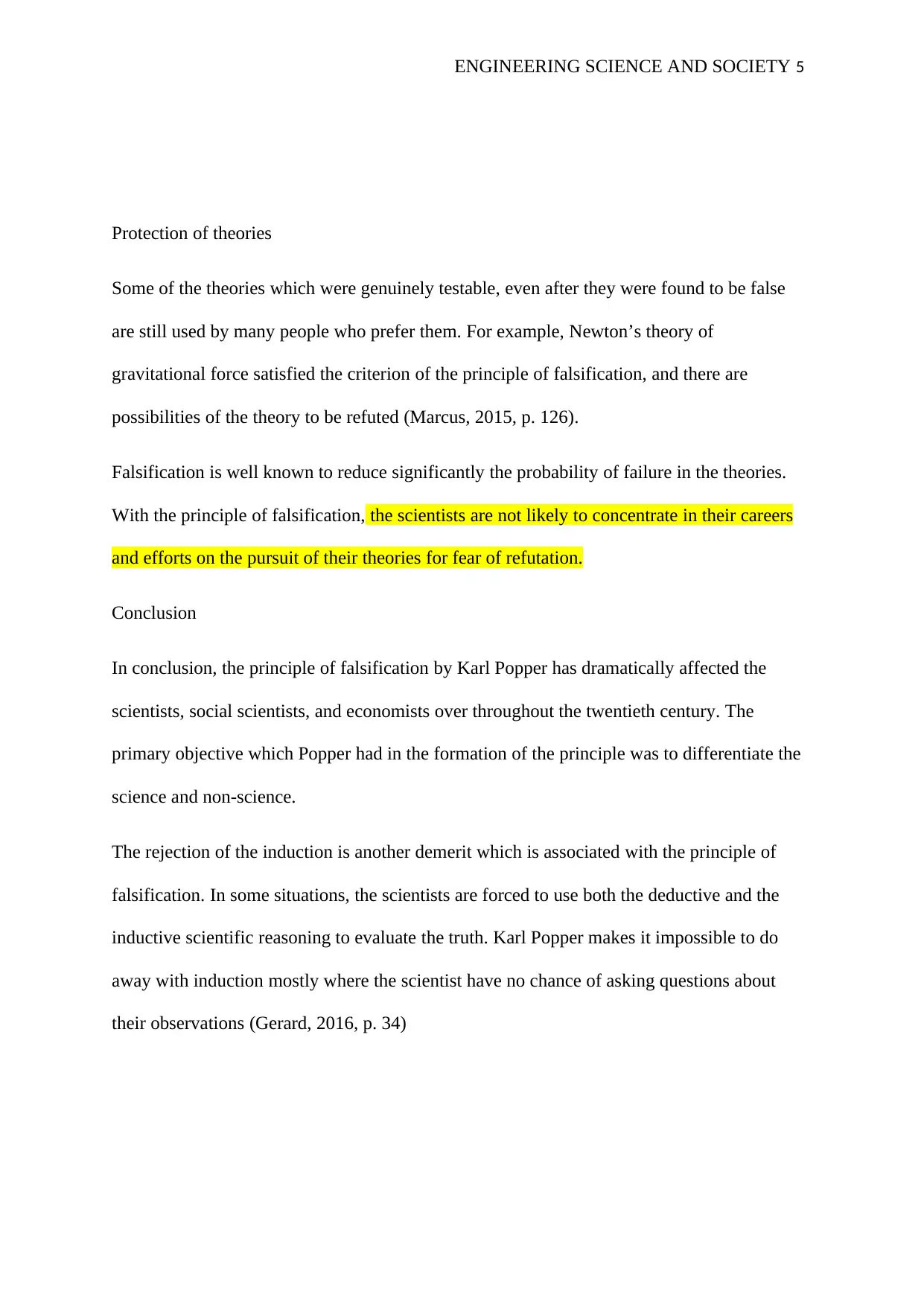
ENGINEERING SCIENCE AND SOCIETY 5
Protection of theories
Some of the theories which were genuinely testable, even after they were found to be false
are still used by many people who prefer them. For example, Newton’s theory of
gravitational force satisfied the criterion of the principle of falsification, and there are
possibilities of the theory to be refuted (Marcus, 2015, p. 126).
Falsification is well known to reduce significantly the probability of failure in the theories.
With the principle of falsification, the scientists are not likely to concentrate in their careers
and efforts on the pursuit of their theories for fear of refutation.
Conclusion
In conclusion, the principle of falsification by Karl Popper has dramatically affected the
scientists, social scientists, and economists over throughout the twentieth century. The
primary objective which Popper had in the formation of the principle was to differentiate the
science and non-science.
The rejection of the induction is another demerit which is associated with the principle of
falsification. In some situations, the scientists are forced to use both the deductive and the
inductive scientific reasoning to evaluate the truth. Karl Popper makes it impossible to do
away with induction mostly where the scientist have no chance of asking questions about
their observations (Gerard, 2016, p. 34)
Protection of theories
Some of the theories which were genuinely testable, even after they were found to be false
are still used by many people who prefer them. For example, Newton’s theory of
gravitational force satisfied the criterion of the principle of falsification, and there are
possibilities of the theory to be refuted (Marcus, 2015, p. 126).
Falsification is well known to reduce significantly the probability of failure in the theories.
With the principle of falsification, the scientists are not likely to concentrate in their careers
and efforts on the pursuit of their theories for fear of refutation.
Conclusion
In conclusion, the principle of falsification by Karl Popper has dramatically affected the
scientists, social scientists, and economists over throughout the twentieth century. The
primary objective which Popper had in the formation of the principle was to differentiate the
science and non-science.
The rejection of the induction is another demerit which is associated with the principle of
falsification. In some situations, the scientists are forced to use both the deductive and the
inductive scientific reasoning to evaluate the truth. Karl Popper makes it impossible to do
away with induction mostly where the scientist have no chance of asking questions about
their observations (Gerard, 2016, p. 34)
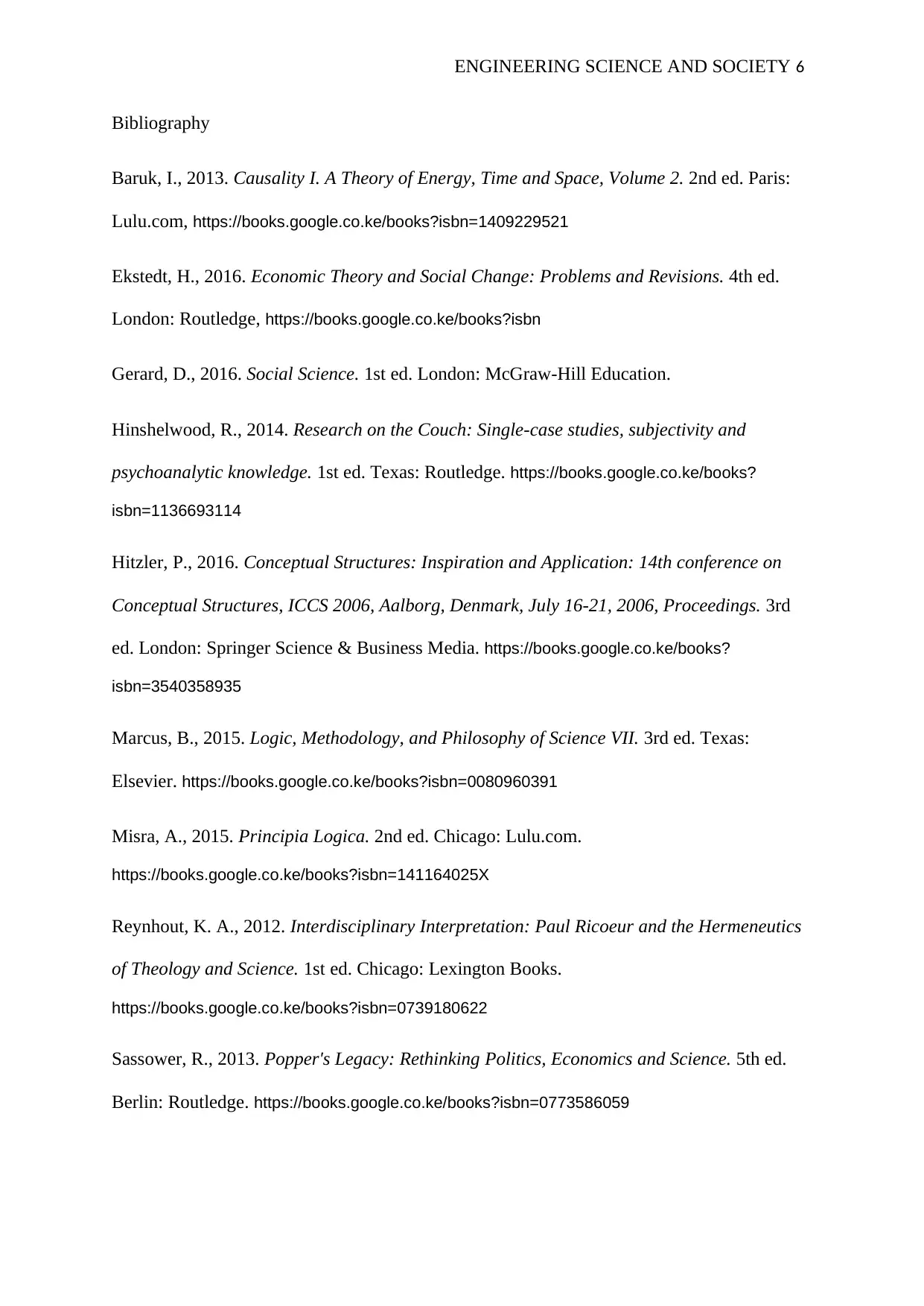
ENGINEERING SCIENCE AND SOCIETY 6
Bibliography
Baruk, I., 2013. Causality I. A Theory of Energy, Time and Space, Volume 2. 2nd ed. Paris:
Lulu.com, https://books.google.co.ke/books?isbn=1409229521
Ekstedt, H., 2016. Economic Theory and Social Change: Problems and Revisions. 4th ed.
London: Routledge, https://books.google.co.ke/books?isbn
Gerard, D., 2016. Social Science. 1st ed. London: McGraw-Hill Education.
Hinshelwood, R., 2014. Research on the Couch: Single-case studies, subjectivity and
psychoanalytic knowledge. 1st ed. Texas: Routledge. https://books.google.co.ke/books?
isbn=1136693114
Hitzler, P., 2016. Conceptual Structures: Inspiration and Application: 14th conference on
Conceptual Structures, ICCS 2006, Aalborg, Denmark, July 16-21, 2006, Proceedings. 3rd
ed. London: Springer Science & Business Media. https://books.google.co.ke/books?
isbn=3540358935
Marcus, B., 2015. Logic, Methodology, and Philosophy of Science VII. 3rd ed. Texas:
Elsevier. https://books.google.co.ke/books?isbn=0080960391
Misra, A., 2015. Principia Logica. 2nd ed. Chicago: Lulu.com.
https://books.google.co.ke/books?isbn=141164025X
Reynhout, K. A., 2012. Interdisciplinary Interpretation: Paul Ricoeur and the Hermeneutics
of Theology and Science. 1st ed. Chicago: Lexington Books.
https://books.google.co.ke/books?isbn=0739180622
Sassower, R., 2013. Popper's Legacy: Rethinking Politics, Economics and Science. 5th ed.
Berlin: Routledge. https://books.google.co.ke/books?isbn=0773586059
Bibliography
Baruk, I., 2013. Causality I. A Theory of Energy, Time and Space, Volume 2. 2nd ed. Paris:
Lulu.com, https://books.google.co.ke/books?isbn=1409229521
Ekstedt, H., 2016. Economic Theory and Social Change: Problems and Revisions. 4th ed.
London: Routledge, https://books.google.co.ke/books?isbn
Gerard, D., 2016. Social Science. 1st ed. London: McGraw-Hill Education.
Hinshelwood, R., 2014. Research on the Couch: Single-case studies, subjectivity and
psychoanalytic knowledge. 1st ed. Texas: Routledge. https://books.google.co.ke/books?
isbn=1136693114
Hitzler, P., 2016. Conceptual Structures: Inspiration and Application: 14th conference on
Conceptual Structures, ICCS 2006, Aalborg, Denmark, July 16-21, 2006, Proceedings. 3rd
ed. London: Springer Science & Business Media. https://books.google.co.ke/books?
isbn=3540358935
Marcus, B., 2015. Logic, Methodology, and Philosophy of Science VII. 3rd ed. Texas:
Elsevier. https://books.google.co.ke/books?isbn=0080960391
Misra, A., 2015. Principia Logica. 2nd ed. Chicago: Lulu.com.
https://books.google.co.ke/books?isbn=141164025X
Reynhout, K. A., 2012. Interdisciplinary Interpretation: Paul Ricoeur and the Hermeneutics
of Theology and Science. 1st ed. Chicago: Lexington Books.
https://books.google.co.ke/books?isbn=0739180622
Sassower, R., 2013. Popper's Legacy: Rethinking Politics, Economics and Science. 5th ed.
Berlin: Routledge. https://books.google.co.ke/books?isbn=0773586059
⊘ This is a preview!⊘
Do you want full access?
Subscribe today to unlock all pages.

Trusted by 1+ million students worldwide

ENGINEERING SCIENCE AND SOCIETY 7
1 out of 7
Your All-in-One AI-Powered Toolkit for Academic Success.
+13062052269
info@desklib.com
Available 24*7 on WhatsApp / Email
![[object Object]](/_next/static/media/star-bottom.7253800d.svg)
Unlock your academic potential
© 2024 | Zucol Services PVT LTD | All rights reserved.